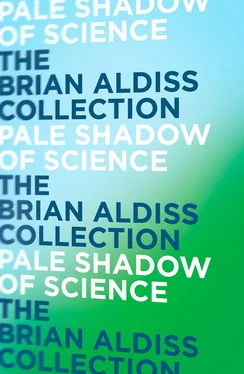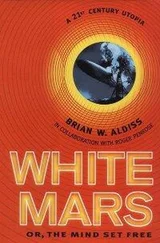Brian Aldiss - Pale Shadow of Science
Здесь есть возможность читать онлайн «Brian Aldiss - Pale Shadow of Science» — ознакомительный отрывок электронной книги совершенно бесплатно, а после прочтения отрывка купить полную версию. В некоторых случаях можно слушать аудио, скачать через торрент в формате fb2 и присутствует краткое содержание. Жанр: unrecognised, на английском языке. Описание произведения, (предисловие) а так же отзывы посетителей доступны на портале библиотеки ЛибКат.
- Название:Pale Shadow of Science
- Автор:
- Жанр:
- Год:неизвестен
- ISBN:нет данных
- Рейтинг книги:5 / 5. Голосов: 1
-
Избранное:Добавить в избранное
- Отзывы:
-
Ваша оценка:
- 100
- 1
- 2
- 3
- 4
- 5
Pale Shadow of Science: краткое содержание, описание и аннотация
Предлагаем к чтению аннотацию, описание, краткое содержание или предисловие (зависит от того, что написал сам автор книги «Pale Shadow of Science»). Если вы не нашли необходимую информацию о книге — напишите в комментариях, мы постараемся отыскать её.
Pale Shadow of Science — читать онлайн ознакомительный отрывок
Ниже представлен текст книги, разбитый по страницам. Система сохранения места последней прочитанной страницы, позволяет с удобством читать онлайн бесплатно книгу «Pale Shadow of Science», без необходимости каждый раз заново искать на чём Вы остановились. Поставьте закладку, и сможете в любой момент перейти на страницу, на которой закончили чтение.
Интервал:
Закладка:
But SF is not only hard science, and related to the first core is a second, also science-fictional, the tale of an experiment in political theory which relates to William Godwin’s ideas. Frankenstein is horrified by his creation and abjures responsibility. Yet the monster, despite its ugliness, is gentle and intelligent, and tries to win its way into society. Society repulses it. Hence the monster’s cry, ‘I am malicious because I am miserable,’ a dramatic reversal of received Christian thinking of the time.
The richness of the story’s metaphorical content, coupled with the excellence of the prose, has tempted commentators to interpret the novel in various ways. Frankenstein ’s sub-title, The Modern Prometheus , leads us to one level of meaning. Prometheus, according to Aeschylus in his play Prometheus Bound , brings fire from Heaven and bestows the gift on mankind; for this, Zeus has him chained to a rock in the Caucasus, where an eagle eats his viscera. [2]Another version of the legend, the one Mary had chiefly in mind, tells of Prometheus fashioning men out of mud and water. Mary seized on this aspect of the legend, whilst Byron and Shelley were writing Prometheus and Prometheus Unbound respectively. Mary, with an inspired transposition, uses electricity as the divine fire.
By this understanding, with Frankenstein acting god, Frankenstein’s monster becomes mankind itself, blundering about the world seeking knowledge and reassurance. The monster’s intellectual quest has led David Ketterer to state that ‘basically Frankenstein is about the problematical nature of knowledge.’ [3] Though this interpretation is too radical, it reminds us usefully of the intellectual aspects of the work, and of Mary’s understanding of the British philosophers, Locke, Berkeley and Hume.
Leonard Wolf argues that Frankenstein should be regarded as ‘psychological allegory’. [4]This view is supported by David Ketterer, who thinks that therefore the novel cannot be science fiction. [5]Godwin’s Caleb Williams is also psychological or at least political allegory; it is nevertheless regarded as the first crime novel.* Surely there are many good SF novels which are psychological allegory as well as being science fiction. Algis Budrys’s Who ? is an example. By understanding the origins of ‘real’ science fiction, we understand something of its function; hence the importance of the question. Not to regard Frankenstein but, say, The Time Machine or even Gernsback’s magazines as the first SF – as many did only a few years ago – is to underestimate the capabilities of the medium; alternatively, to claim that Gilgamesh or Homer started it all is to claim so almost anything becomes SF.
Mary Shelley wanted her story to ‘speak to the mysterious fears of our (i.e. humankind’s) nature’ … Is that not what SF still excellently does?
That the destructive monster stands for one side of Shelley’s nature, and the constructive Victor for the other has been convincingly argued by another critic, Christopher Small. [6]Mary’s passion for Shelley, rather than blinding her, gave her terrifying insight. In case this idea sounds over-sophisticated, we must recall that Mary herself, in her Introduction to the 1831 edition of her novel, means us to read it as a kind of metaphor when she says ‘Invention … does not consist in creating out of void, but out of chaos; the materials must, in the first place, be afforded: it can give form to dark, shapeless substances, but it cannot bring into being substance itself.’
In referring to Frankenstein as a diseased creation myth, [7]I had in mind phrases with sexual connotations in the novel such as ‘my workshop of filthy creation,’ used by Frankenstein of his secret work. Mary’s life experience taught her to regard life and death as closely intertwined. The genesis of her terrifying story came to Mary in a dream, in which she says she saw ‘the hideous phantasm of a man stretched out, and then, on the working of some powerful engine, show signs of life, and stir with an uneasy half vital motion.’ The powerful line suggests both a distorted image of her mother dying, in those final restless moments which often tantalisingly suggest recovery rather than its opposite, and also the stirrings of sexual intercourse, particularly when we recall that ‘powerful engine’ is a term which serves in pornography as a synonym for penis.
The critic, Ellen Moers, writing on female gothic, [8]disposes of the question of how a young girl like Mary could hit on such a horrifying idea (though the authoress was herself the first to raise it). Most female writers of the eighteenth and nineteenth century were spinsters and virgins, and in any case Victorian taboos operated against writing on childbirth. Mary experienced the fear, guilt, depression and anxiety which often attend childbirth, particularly in situations such as hers, unmarried, her consort a married man with children by another woman, and beset by debt in a foreign place. Only a woman, only Mary Shelley, could have written Frankenstein . As Beard’s girlfriend says, ‘She was the only one of the lot of them who knew about life.’
Moreover, the casual remark made by Beard’s girlfriend takes us into a deeper level of meaning which, although sufficiently obvious, has not been remarked upon to my knowledge. Frankenstein is autobiographical.
It is commonly accepted that the average first novel relies for its material on personal experience. We do not deny other interpretations – for a metaphor has many interpretations – by stating that Mary sees herself as the monster. This is why we pity it. She too tried to win her way into society. By running away with Shelley, she sought acceptance through love; but the move carried her further from society; she became a wanderer, an exile, like Byron, like Shelley. Her mother’s death in childbirth must have caused her to feel that she, like the monster, had been born from the dead; behind the monster’s eloquence lies Mary’s grief. Part of the continued appeal of the novel is the appeal of the drama of the neglected child.
Upon this structure of one kind of reality, Mary built a further structure, one of the intellect. A madness for knowledge abounds; not only Frankenstein but the monster and Walton also, and the judicial processes throughout the book, are in quest for knowledge of one kind and another. Interestingly, the novel contains few female characters (a departure from the Gothic mode, with its soft, frightened heroines); Victor’s espoused remains always a cold and distant figure. The monster, product of guilty knowledge, threatens the world with evil progeny.
The monster is, of course, more interesting than Victor. He has the vitality of evil, like Satan in Milton’s Paradise Lost before him and Quilp in Dickens’s The Old Curiosity Shop after him, eloquent villains both. It is the monster that comes first to our minds, as it was the monster that came first to Mary’s mind. The monster holds its appeal because it was created by science, or at least pseudo-science, rather than by any pacts with the devil, or by magic, like the golem.
Frankenstein emerges from the Gothic tradition. Gothic still tints science fiction with its hues of suspense and doom. In Billion Year Spree I argued that Frankenstein was the first real science fiction novel. Here the adjective ‘real’ serves as an escape clause. The point about discussing where science fiction begins is that it helps our understanding of the nature and function of SF. In France in pre-Revolution days, for instance, several books appeared with Enlightenment scenarios depicting a future where present trends were greatly developed, and where the whole world became a civilized extension of the Tuilleries. The best-known example is Sebastien Mercier’s L ’ An 2400 , set seven centuries ahead in time; it was translated into several foreign languages. Mercier writes in the utopian tradition; Mary Shelley does not. Here we see a division of function. Jules Verne was influenced by Mercier, and worked with ‘actual possibilities of invention and discovery.’ H.G. Wells was influenced by Frankenstein , and wrote what he called fantasies – the phrase set in quotes is Wells’s, who added that he ‘did not pretend to deal with possible things.’* One can imagine Mary Shelley saying as much.
Читать дальшеИнтервал:
Закладка:
Похожие книги на «Pale Shadow of Science»
Представляем Вашему вниманию похожие книги на «Pale Shadow of Science» списком для выбора. Мы отобрали схожую по названию и смыслу литературу в надежде предоставить читателям больше вариантов отыскать новые, интересные, ещё непрочитанные произведения.
Обсуждение, отзывы о книге «Pale Shadow of Science» и просто собственные мнения читателей. Оставьте ваши комментарии, напишите, что Вы думаете о произведении, его смысле или главных героях. Укажите что конкретно понравилось, а что нет, и почему Вы так считаете.










